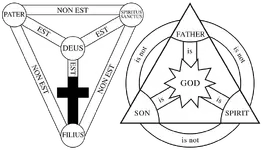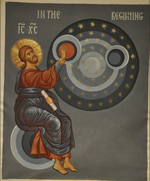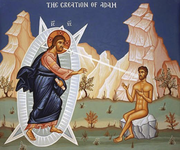"To believe that YHWH has a Father is not heretical. His father is the Father, El Elyon, God in the Highest. YHWH the Logos is El Elyon’s only begotten son. The other angels are his sons, too, but they are created, not begotten.
Deuteronomy 32:8-9 has YHWH as one of the sons of El Elyon (“God of gods” or “God in the Highest”):
"When the Most High (‘elyon’) gave to the nations their inheritance, When He separated humanity, He fixed the boundaries of the peoples according to the number of divine beings. For YHWH’s portion is his people [Israel] Jacob his allotted heritage."
So YHWH was the ba’al – the bar El, “son of God” — of Israel, while, e.g., Addu was the ba’al of Ugarit, and Moloch the ba’al of Tyre. The “gods of the nations” (a familiar phrase in scripture) are also often called “shepherds.”
Early in Israel’s history, YHWH was understood as separate from El. Later they were assimilated to each other, but from the start YHWH was the son of the Father. Many of the more perplexing utterances of Jesus are much easier to understand if we remember that he is the incarnation of YHWH the Son.
[...]
El is the title of the Most High God of ancient (pre-Israelite) Ugarit, and is still in use today to refer to the Most High God, by both Muslims and Christians, in its Arabic cognate, Allah. El Elyon appears in Genesis 14:18-19 as the God of Melchizedek the Priest at Salem (Jerusalem) to whom Abraham sacrificed and tithed, and in whose eucharist he partook; whose Great High Priest is Jesus, and to whose priestly order, prior and superior to the Aaronic priesthood, all Christians are ordained forever (baptism being the rite of ordination to this priesthood).
With the doctrine of the Trinity, this does indeed get tricky. El and YHWH are different persons, but the same essential being: they perfectly implement exactly the same Nature. They are not a single entity, that appears to us under different species, or aspects, depending on what face (Greek prosopon, Latin persona) it presents to us. That notion, simpliciter, is the heresy of modalism. But, compliciter, it is orthodox, because the Persons perichoresce: whatever is true of El is true also of YHWH and of the Holy Spirit. Thus each of the Persons is an aspect of the other two.
Perichoresis is a most useful term from Patristic theology, used by the Greek Fathers to refer to the relation of the Persons. It means literally “dance-about.” When square dancers join hands and dance coordinately in a circle, they perichoresce. The Latin fathers translated the term as circumincession, which captures a different aspect of what the Greek fathers were getting at in using the term perichoresis: circumincession means literally, “about-in-going.” In the dance of the Trinity, there is complete fluxion from each Person to both of the others; all of them perfectly inform each of them. Unlike human square dancers, then, the Persons of the Trinity dance in perfect accord. They are as one, and form a substantial unity; but they are different from each other (this being the only way they could have a relation in the first place).

What is true then of God is true of God the Father, God the Son, and God the Holy Spirit. So in speaking to Jesus, we are speaking to the Father and to the Holy Spirit, to the whole Trinity; and when any one of the Persons speaks, or acts, all of them do. So Jesus prays to his Father; yet he insists also that he and his Father are one. So likewise we hear in Samuel 22:14 that “YHWH thundered from heaven, and Elyon uttered his voice.” So likewise in Psalm 97:9 we sing, “For you, YHWH, are Elyon over all the earth; you are raised high over all the elohim,” and in Psalm 78:35 that, “they remembered that Elohim was their rock, and El Elyon their redeemer.” So likewise El Shaddai appeared to Abraham at Mamre as three angels, who spoke as one who is on the one hand agent and ambassador of YHWH, and on the other is YHWH himself. God is a One who is a Many. He is Elohim: literally, “gods.”
But out of all the elohim, YHWH is the proper name of the el who is the only begotten Son of El Elyon."
(source unknown)





